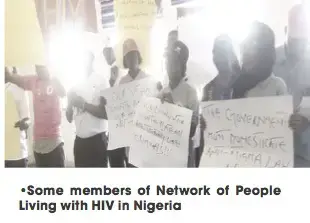The Network of People Living with HIV in Nigeria (NPLHIV), Plateau State chapter, has called on Governor Caleb Manasseh Mutfwang to, as a matter of urgency, address the years of neglect they faced following the financial starvation of the Plateau State HIV/AIDS Control Agency saddled with the responsibility of their welfare and programmes.
The coordinator of PLHIV in the state, Mr. Ezekiel Afan, addressing the 2023 World AIDS Day ceremony at Apin Conference Hall, Old Jos University Teaching Hospital (JUTH), Jos, the state capital, expressed dismay on the way and manner government left them without budgetary releases over the years.
•Afan (left)
He noted that the sorry situation at the Plateau State AIDS Control Agency (PLACA), the agency in charge of their living conditions and programmes, running on zero budget with unhabitable environment over the years was disheartening and required urgent attention.
The network noted: “We are not happy with government treatment of HIV patients in the state. We may argue that it is too early to conclude on this present government but we are afraid it is going to be business as usual. Therefore, we are drawing the attention of the government of Plateau State to HIV response.
“We have four demands: Number one is that the state government should include some percentage of the 2024 budget to HIV and this fund will be monitored by the patient community to ensure that it is released.

•A section of the PLACA dilapidated building
“Government should ensure sustainability by taking at least one or two hospital facilities to render free services to HIV patients.
“The government as a matter of urgency should domesticate the anti-stigma law passed in 2014 by the Federal Government of Nigeria.
“The Plateau State Agency for the Control of HIV/AIDS is on the verge of collapsing and should be renovated immediately.”
Members of the network of people living with HIV were seen carrying placards in protest as the state marksed the 2023 World AIDS Day, with different inscription such as: “Take action to ensure no one gets new HIV/infection”, “Let communities lead”, “Take action to ensure no child is born with HIV”, “#PLHIV, our votes count, but our health does not matter”, “The government must domesticate anti-stigma law now!!!,” “People living with HIV are treated like criminals”, and “Plateau State government has zero commitment to HIV/AIDS response”, among others.
Afan alleged that government has withdrawn services at PLACA: “The state government has no budget for PLACA, the agency has been running on zero budget. They don’t release money to PLACA and, over the years, anytime we go there, they only attend to us with word of mouth and no releases.
“The PLACA structure is completely dilapidated, the ceilings are falling, roof leaking, environment not conducive. That place is left as if it is not for humans.”
The state coordinator of the network noted that the HIV community ought to have been included in the budget planning process.
“If we are included in the budget process, we will ensure that we keep tracking the budget and ensure its releases for our activities.
“The agency for some years now has been operating with an acting chief executive, no substantial appointment to enable the person meet the governor and table our problems,” Afan said.
Commissioner for Health, Dr. Cletus Shurkuk, had earlier disclosed that Plateau State was one of the states of the federation that had attained the HIV treatment saturation target in the country.
He said the state currently had 49,539 people on treatment and over 95% of the clients were virally suppressed. He, however, said that despite the giant strides, there was still an unmet treatment gap among the paediatric sub-population and the prevention of mother-to-child transmission sub-population, calling for collective efforts from stakeholders towards eradicating the virus in 2030 as a global threat to public health. The commissioner further explained that this year’s World AIDS Day, with the theme “Let communities lead,” was chosen to mark the important impact communities have in shaping the HIV response.
This, he said, is because communities connect people with person-centred public health services, build trust, innovate, monitor implementation of policies and services as well as hold providers accountable.
“HIV/AIDS remains a major global public health issue as there were an estimated 39 million people living with it at the end of 2022, two-thirds of whom are in WHO African region, 630,000 people died from HIV-related causes and 1.3 million people acquired HIV,” he said.
The health commissioner further stated that there was no cure for HIV infection, noting, however, that with access to effective HIV prevention, diagnosis, treatment and care, it has become a manageable chronic health condition, enabling people to live with it and lead long and healthy lives.
“From the last National AIDS Impact Indicator Survey conducted in 2018, Nigeria had a prevalence rate of 1.4%, while Plateau State had 1.6%. Since then, there have been actors in the field working tirelessly towards achieving UNAIDS set goal of 95-95-95.
“That is, 95% of the population should have access to testing and know their HIV status; 95% who know their status and are positive should be on treatment; and 95% of those on treatment should be virally suppressed.
“Plateau State is one of the states that have attained HIV treatment saturation. The state has 49,539 people currently in treatment and over 95% of the clients are virally suppressed,” Shurkuk explained.
“The progress we have made in the HIV/AIDS response requires government, the community, civil society, advocates, activists, faith-based communities, public and private organizations to come together for the shared goal to save lives and change the course of HIV/AIDS in Nigeria and the world at large.
“This will require continued engagement, commitment and will to end HIV/AIDS as a public health threat by 2030.”
The Plateau State AIDS programme coordinator, Mrs. Maria Bawa, also noted that more efforts were needed towards having a generation free of HIV, especially from birth.
“Scaling up prevention of mother-to-child transmission (PMTCT) is key for us because we want to prevent future generations from getting this HIV.
“The treatment centres we have were 16; we have another 29 treatment centers, then we have 30 PHCs, making a total of 65 health facilities that are providing health services in Plateau State.
“But we know that there are over 1,000 health facilities in Plateau State. There is the need to reach out to all the facilities that partners are not supporting so that no pregnant woman comes for clinic and goes home without knowing her HIV status,” Bawa explained.
A visit to the agency left much to be desired. The level of infrastructural decay at the PLACA headquarters located a 5, Naraguta Avenue, Jos, was unimaginable.
Acting executive director of the agency, Mrs. Martha Swomen, said the agency, whose responsibility is to coordinate the activities of persons living with HIV/AIDS in the area of welfare, training, skills acquisition, collection of data, among others, now depends on support from two partners.
“We coordinate activities for people living with HIV/AIDS. We see to their welfare, treatment, care and support. We make sure they live healthy lives. We receive data for HIV and AIDS and send to the national body,” she said.
The agency is said to have received support from the World Bank in 2011 and ended in 2017, a break that in 2010 had the state recording the highest burden of 7.7% cases of HIV/AIDS and in 2012 dropped to 2.3% after some interventions, but rose again in 2014 to 5.9% when the interventions ended.
“The World Bank has been supporting the state from 2004 to 2014. So, there was a break in terms of intervention, but with the World Bank funding again we go on campaigns, creating awareness in our communities, testing everywhere in the communities and we were able to control it to 1.6%.
“At the moment, we only have two partners that have been supporting HIV AIDS activities in the state, especially in the area of treatment, care and support. Like Apin is our lead partners in the state and Society for Family Health has a one-stop shop where key population go to get treatment, care and support,” she explained.
The agency trained orphans who were affected with HIV/AIDS and might have lost both parents as a result of HIV/AIDS complications, in the area of skills in order to take care of their siblings, as well as those HIV/AIDS patients who lost their jobs because of stigmatization.
“We train people living with HIV/AIDS with skills because most of them are sent out of work, amounting to stigma. Plateau State is the only state in Nigeria that is yet to sign into law the anti-stigma bill. We are praying and hoping that, with the new government in place, they will do something about it,” Swomen stated.
For 23 years old Sarah Gogwim, leader of a youth organization known as Association of Positive Youths Living with HIV/AIDS in Nigeria (APYIN), there are high rates of stigmatization against young people living with HIV in schools, workplaces and communities on the Plateau.
“APYIN ensures adequate access to affordable and appropriate treatment and care options among young people living with HIV/AIDS in Nigeria. We advocate the protection of basic human rights of young people living with HIV/AIDS in Nigeria.
“The challenges we are facing consist of low viral suppression; 19% of youths lack of love from homes, face stigma and discrimination. Stigma is still a problem, either from community, school or even self-stigma among young people with HIV.
“We want the signing into law and implementation of the anti-stigma and discrimination bill in the state,” Gogwim said.




